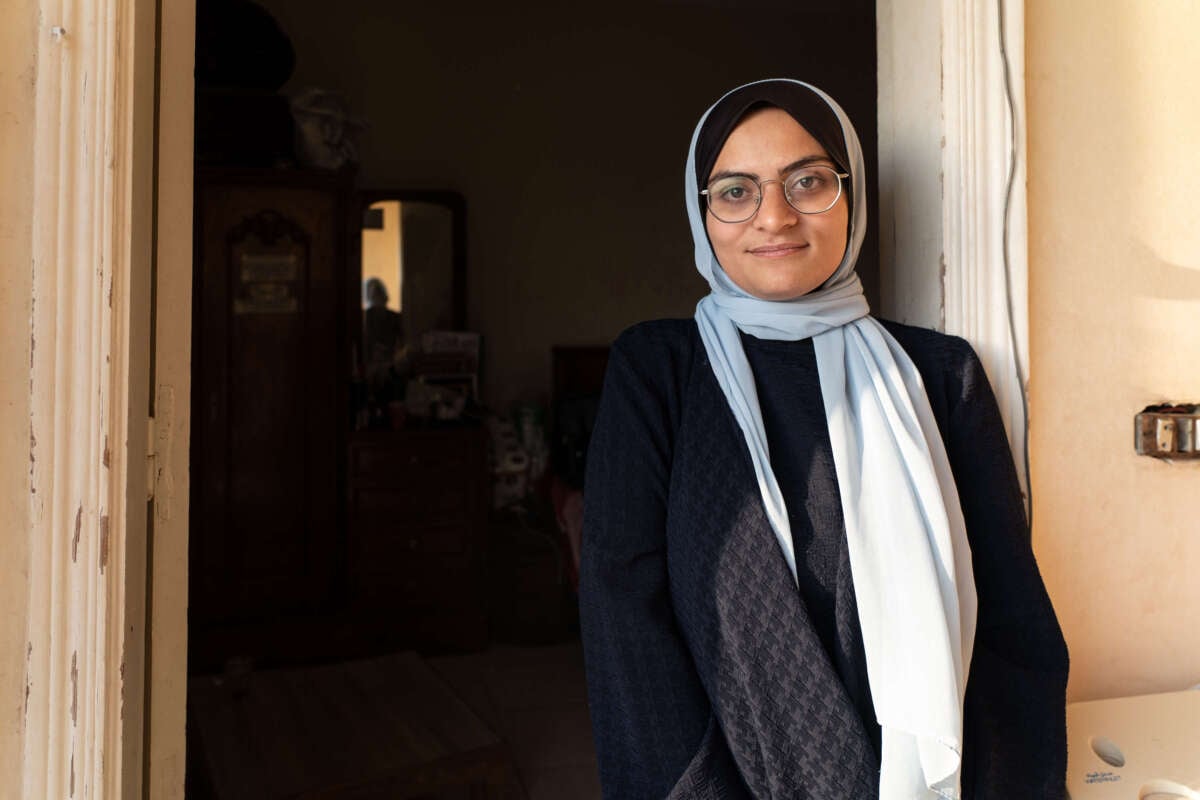Part of the Series
Struggle and Solidarity: Writing Toward Palestinian Liberation
Support justice-driven, accurate and transparent news — make a quick donation to Truthout today!
Sometimes Afnan al-Hashim finds herself feeling envious of her 36-year-old sister Fida, who was killed in an Israeli airstrike in February, along with her husband and four small children — one of whom was just six months old. Israel had carpet-bombed the densely packed Jabalia refugee camp in the north of Gaza City, which has now been left in ruins from Israel’s unprecedented nine-month long bombardment of the besieged Palestinian enclave. One of the strikes hit her sister’s home in the camp.
“They retrieved her body from the rubble, but she was shredded into pieces,” the 30-year-old recounts, sitting on a bed in a small room she now rents on the roof of an apartment building in the Egyptian capital of Cairo. “They couldn’t find the bodies of the children; they were all buried deep below the debris. They are still there now.” Hashim lost 40 members of her family in the attack.
Before October 7, Hashim was living in Cairo with her husband, who was studying dentistry there. Hashim, however, was eight months pregnant and returned to Gaza City to prepare for the birth of her child. Soon afterwards, Israel began its devastating aggression on Gaza.
Israel has so far killed more than 40,000 Palestinians, according to the Gaza Ministry of Health, in what many human rights observers say is a textbook case of genocide. According to a recent study that accounts for deaths from starvation, disease, as well as people missing under the rubble, the accumulative effects of Israel’s war on Gaza means the true death toll could reach more than 186,000 people.
“I felt like my sister was the lucky one,” Hashim continues, her lips quivering. “At least she died with her whole family and she doesn’t have to see all of this death and destruction. It is easier to die in Gaza than to live.”
In March, Hashim and her family escaped Israel’s indiscriminate killings in Gaza and left for Egypt to reunite with her husband. They left through the Rafah crossing — the only exit out of Gaza not bordered by Israel and the single route out of the territory for civilians fleeing the war.
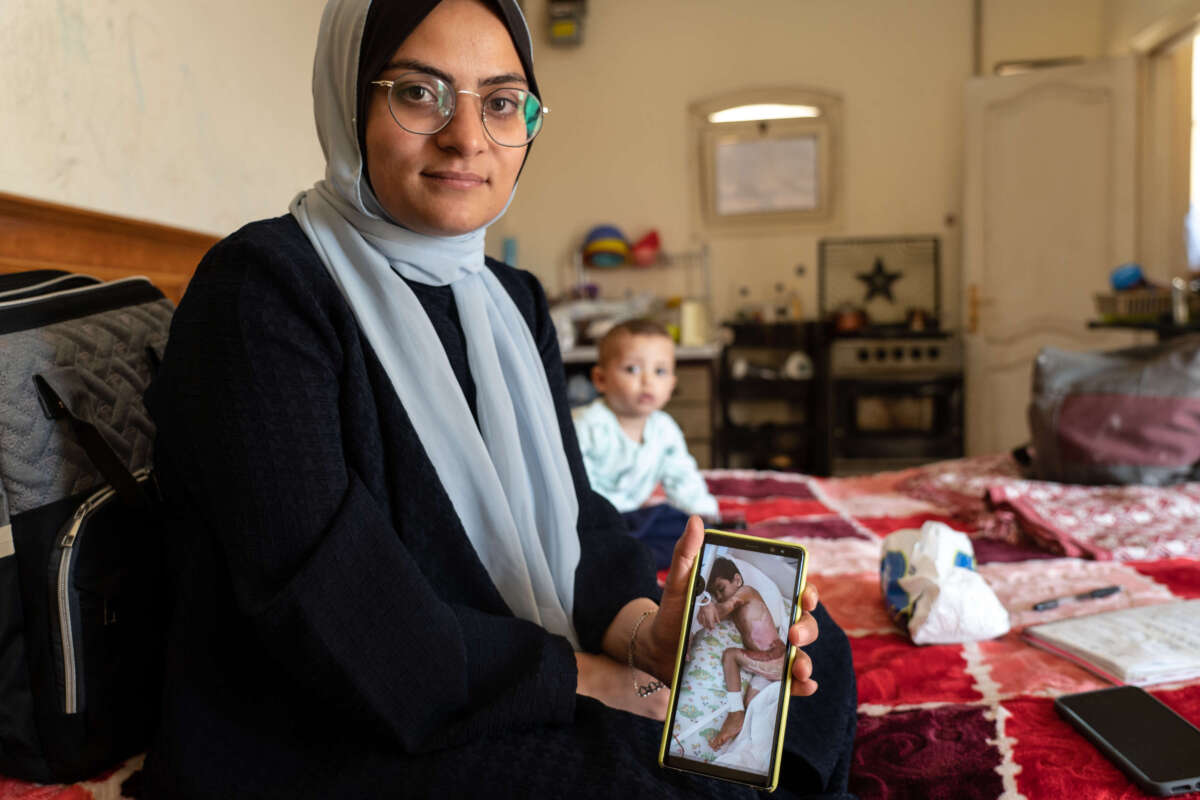
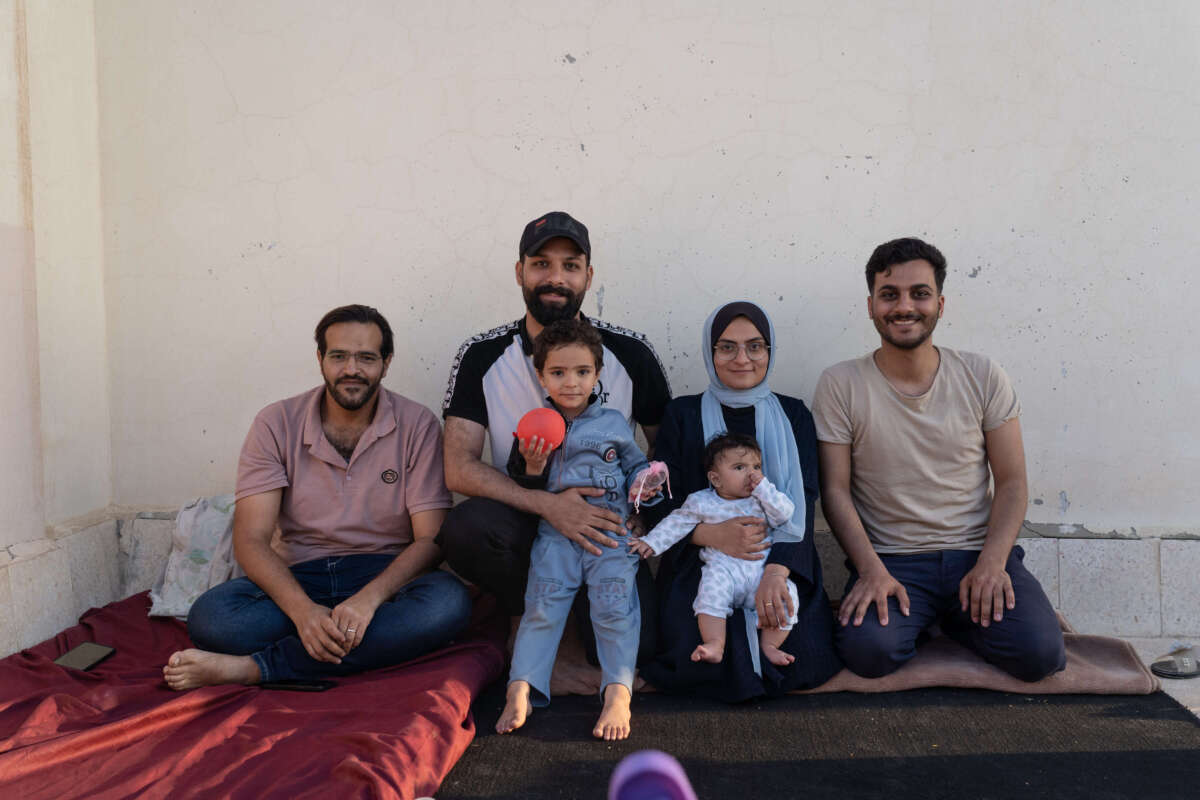
The journey through Rafah necessitates paying an exorbitant fee to Hala Consulting and Tourism, an Egyptian company owned by Sinai tribal leader and business tycoon Ibrahim al-Organi. Hashim’s family paid nearly $30,000 to get her children, brothers and parents out. Unless Palestinians have foreign passports, international connections with a foreign country appealing on their behalf, or approval for medical treatment in Egypt, paying the fee is the only option for escape through the crossing.
By some estimates, as many as 100,000 Palestinians have escaped into Egypt since the war began. In May, however, as Israel began its long-anticipated ground invasion into Rafah, the military took over the Palestinian side of the crossing, which is also used to deliver humanitarian aid. It has been closed ever since.
“We Have No Idea What Is Next for Us”
Hashim spends her days now scrolling through her phone, eyes bloodshot from perpetually staring at the violent images and videos from Gaza. Her nine-month-old daughter, Watin, awakes from a nap with a slight whimper. “This is my war baby,” Hashim giggles, covering her small daughter with a blanket on the bed beside her. Hashim also has a 4-year-old son, Adam.
Despite no longer being tormented by Israeli drones and fighter jets above them, Hashim and the rest of her family — including her two brothers and parents, who arrived in Egypt at separate times — travel everywhere together in Cairo, too fearful to leave each other’s sides.
Palestinians from Gaza currently living in Cairo say they were given a 45-day permit upon arriving in Egypt. The Egyptian government has overlooked the tens of thousands of Palestinians overstaying their permits during the war. But undocumented Palestinians cannot open bank accounts, attend school, open a business, or get health insurance.
Many have turned to charity to survive. “I’m feeling so lost,” Hashim says, in tears; her family is also now entirely reliant on the help of others, lining up to collect cash assistance from the Palestinian embassy in Cairo and various nonprofit organizations to afford basic necessities, such as rent and food.
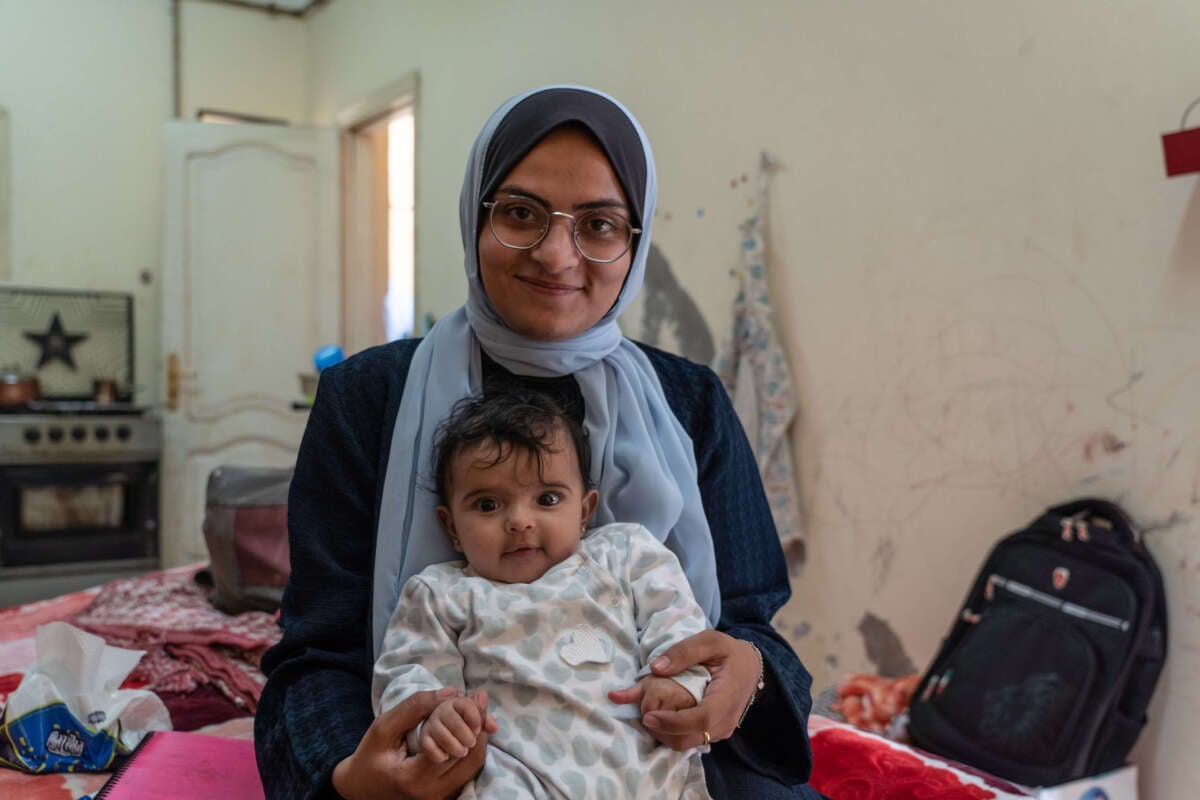
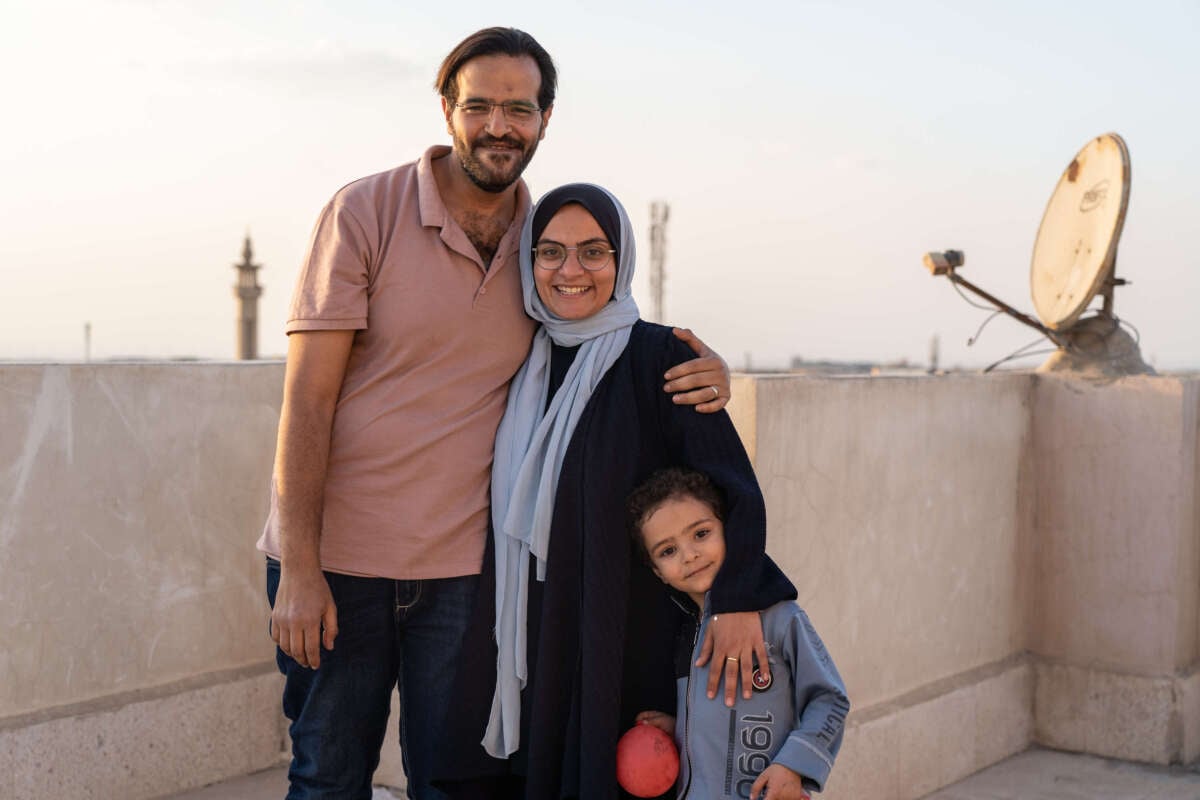
The Palestinian embassy has also pushed the Egyptian government to issue temporary residency permits for Palestinians from Gaza until the war is over in order to ease the conditions for them, but to no avail.
“I don’t think I’ll ever recover from this,” Hashim says. “We have no idea what is next for us. I lost the meaning I once had for life. After experiencing all this it really doesn’t matter to me if I am alive or dead — they have both started to look the same to me.”
“Trauma by Proxy”
Alongside the legal difficulties of fleeing genocide comes the mental anguish. “If you are in Gaza, then obviously the trauma remains,” explains Jess Ghannam, a Palestinian American psychologist and professor who has researched trauma among Palestinians in Gaza for the past 25 years.
“But even if you’re in Egypt and in the United States — wherever you end up — you still get constantly bombarded by secondary trauma — trauma by proxy — because the war is literally being broadcast live on social media,” he tells Truthout. “So Palestinians are being re-traumatized on a regular, if not daily, basis.”
Ghannam says that the extreme violence Israel has unleashed on Palestinians in Gaza “has not been seen before in the modern era in terms of the breadth and depth of the traumatic exposure that Palestinians in Gaza have been experiencing going on for nine months now.”
“There’s nothing in comparison,” he adds.
Psychologists are now having to reconfigure and redevelop their theoretical framework for understanding traumatic exposure, Ghannam explains. “Concepts of post-traumatic stress disorder (PTSD) [do] not even come close to helping us understand [the experiences of Palestinians in Gaza] because for all of those people still in Gaza — and including those who have left — there is no ‘post’ in ‘post-traumatic stress disorder’ because the traumatic exposure remains.”
“One of the biggest misconceptions around those who fled Gaza is that somehow they are psychologically better off, but they’re really not,” Ghannam says. “Especially for the Palestinians in Egypt, it’s a horrific situation for them.”
Like other Palestinians who have escaped from Gaza, Hashim and her surviving family are terrified they may never be allowed to return. They fear a repeat of what their ancestors went through in 1948, during the Nakba, or “catastrophe,” when some 750,000 Palestinians were expelled from their homes during the creation of the Israeli state, and later again in 1967, when Israel occupied the West Bank and Gaza Strip.
Like their ancestors before them, who continue to possess the keys to their pre-1948 homes, most of which were destroyed or handed over to incoming Jewish immigrants to the new state of Israel, many of the people fleeing Gaza now also left with the keys to their homes. About 80 percent of Gaza’s population are refugees or descendants of those ethnically cleansed from their homes in 1948.
“Palestinians are completely devastated by the idea that they may never be able to return [to Gaza],” Ghannam says. “And they are tormented by this generational burden of being forced to leave in 1948 and 1967 with the idea that they would be able to go back and even took their keys with them — and then the memory of that return never happening.”
“We Will Go Back”
Now safe in a Cairo apartment, Bothaina Jabr and her nine children, who range in age from nine months to 13 years old, still all sleep together in one room — a habit they formed in Gaza after their home in Rafah was targeted in an airstrike. If it happened again, they all wanted to die together.
Jabr, 40, and her children were able to escape through the Rafah crossing at different times in January and February, with the first group allowed to cross for medical treatment after Jabr’s small daughters were wounded in the airstrike. Jabr’s husband is still in Gaza.
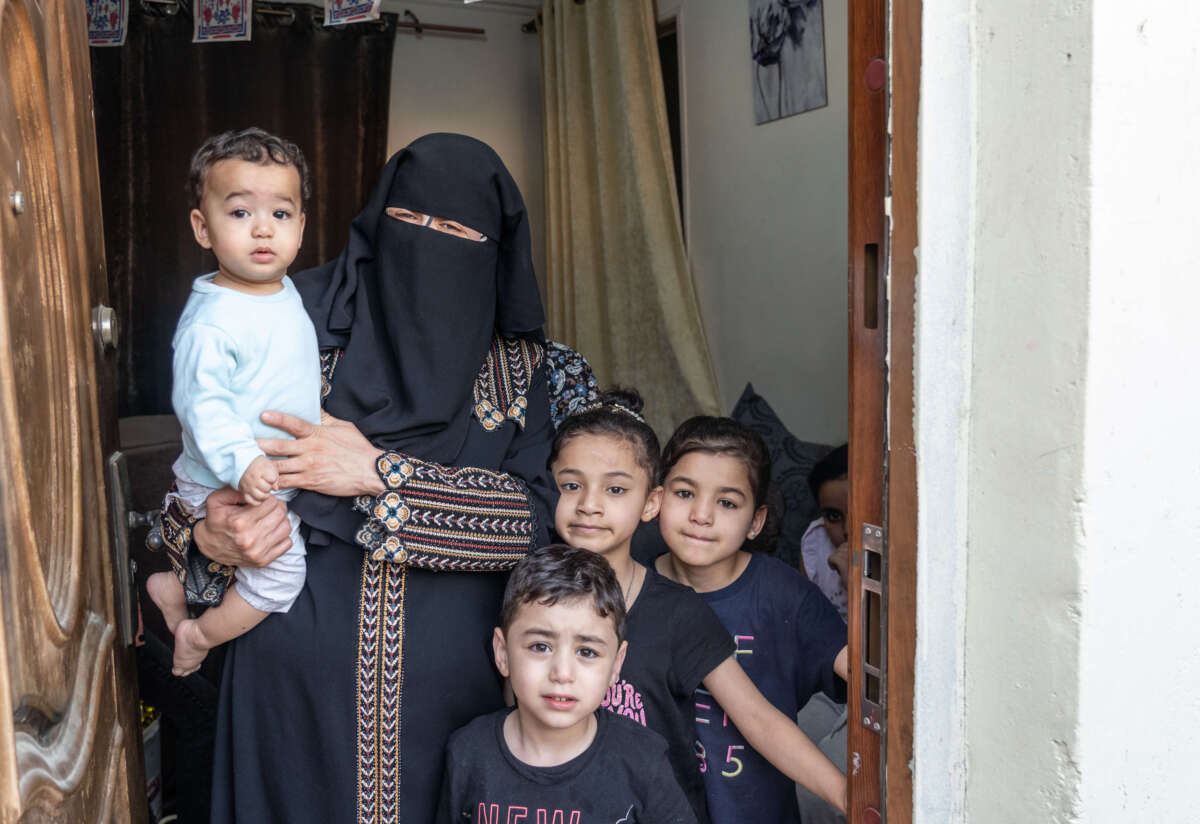
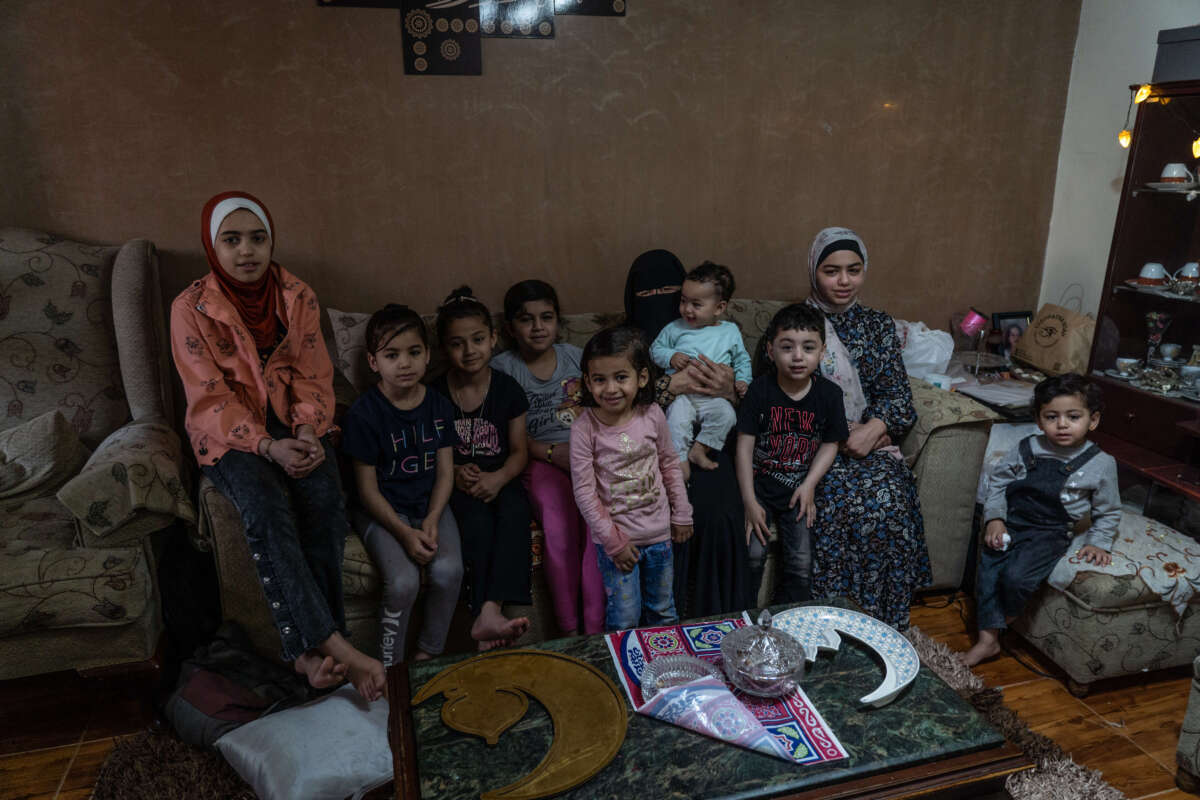
Israel targeted the family’s home in December — reducing it entirely to rubble. Nine-year-old Sara sustained injuries on her head and the skin on 13-year-old Alaa’s face and body tore and burned. The most badly injured, however, was 11-year-old Saja, who got pinned between the floor and a collapsed wall. Part of her skull was completely crushed and she developed internal bleeding; her eyesight has been permanently damaged from the injuries.
Saja holds up a photo of herself in the hospital on her mother’s mobile phone, showing her grisly wounds. She shyly glances at her siblings and starts laughing — a reaction that Ghannam says makes sense for Palestinian children who have fled the violence in Gaza.
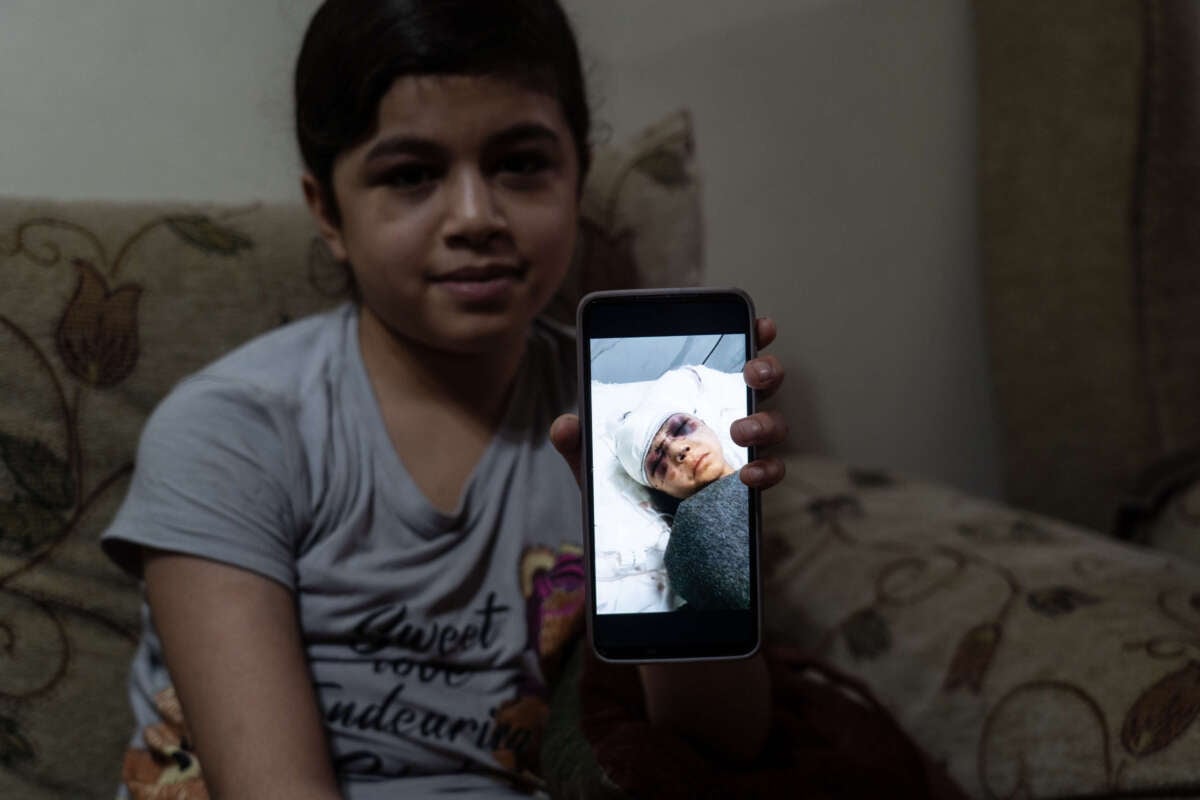
“Children don’t have any other coping mechanism,” he explains. “Time must pass and people need space and distance away from the traumatic event to give their body and their brains an opportunity to process what has happened — and [Palestinians] don’t have that.”
According to the United Kingdom-based charity Save the Children, which works with children from Gaza in Egypt, “many are struggling with nightmares, anger, bedwetting, and anxiety,” and some children “have become withdrawn and show no signs of emotion.”
Jabr says her children are experiencing sleep issues and nightmares. They are frightened by loud noises and the sounds of airplanes flying from the Cairo airport, mistaking them for explosions or Israeli drones.
One of the biggest concerns for Palestinian families in Egypt is education for their children, which has been denied for the foreseeable future.
Jabr, who was a math teacher in Gaza, does her best to create a semblance of normalcy for her children. “I make them study each day and continue their lessons like they are still in school,” she tells Truthout. “There is so much uncertainty around when we can go back to Gaza. So I make sure they keep hope that this war will end and all of this is just temporary and they will be back at their schools in Gaza soon.”
When asked if she had fears around Israel not allowing those who left Gaza to ever return, the possibility seemed too painful for Jabr to consider.
“I’ve never left Gaza before and I never wanted to,” she says, her children piling up beside her on the couch. “Even though we lived under siege, the people of Gaza were always trying to be happy despite all the difficulties. We are people who love life.”
“We will go back.… We have to go back. I don’t know who I am unless I am in Gaza.”
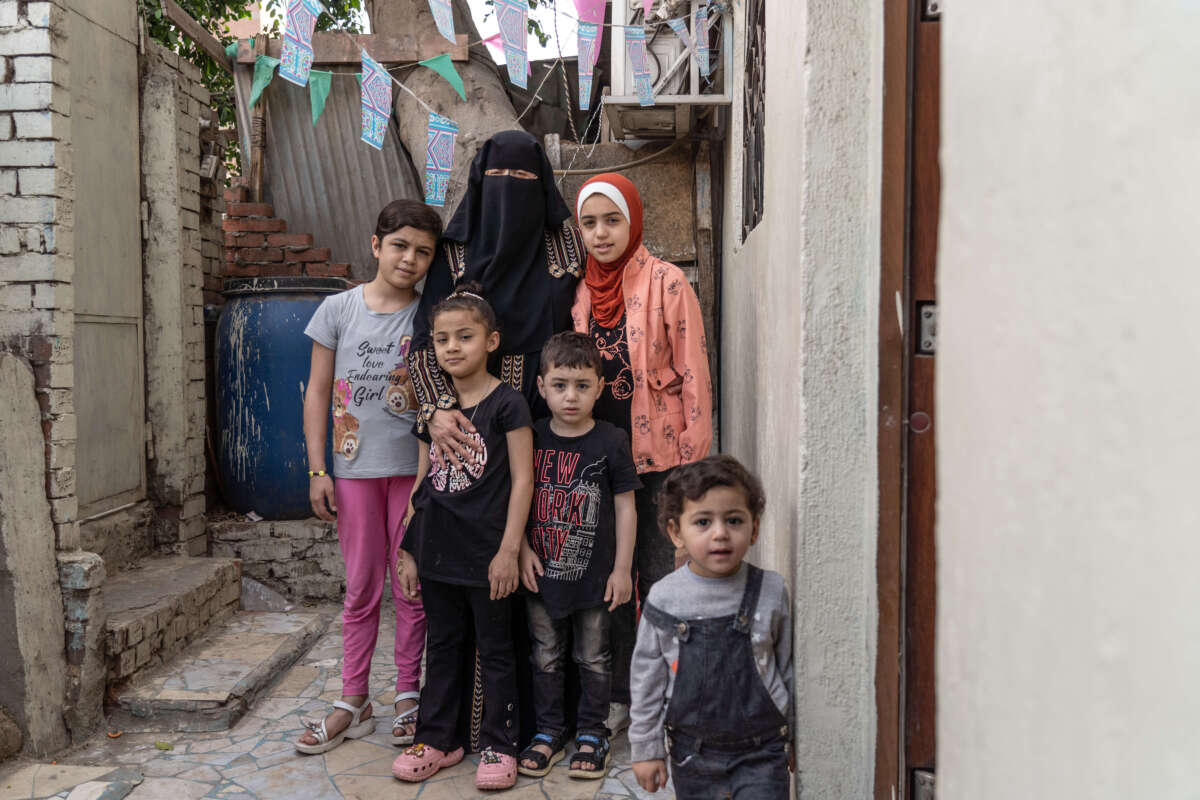
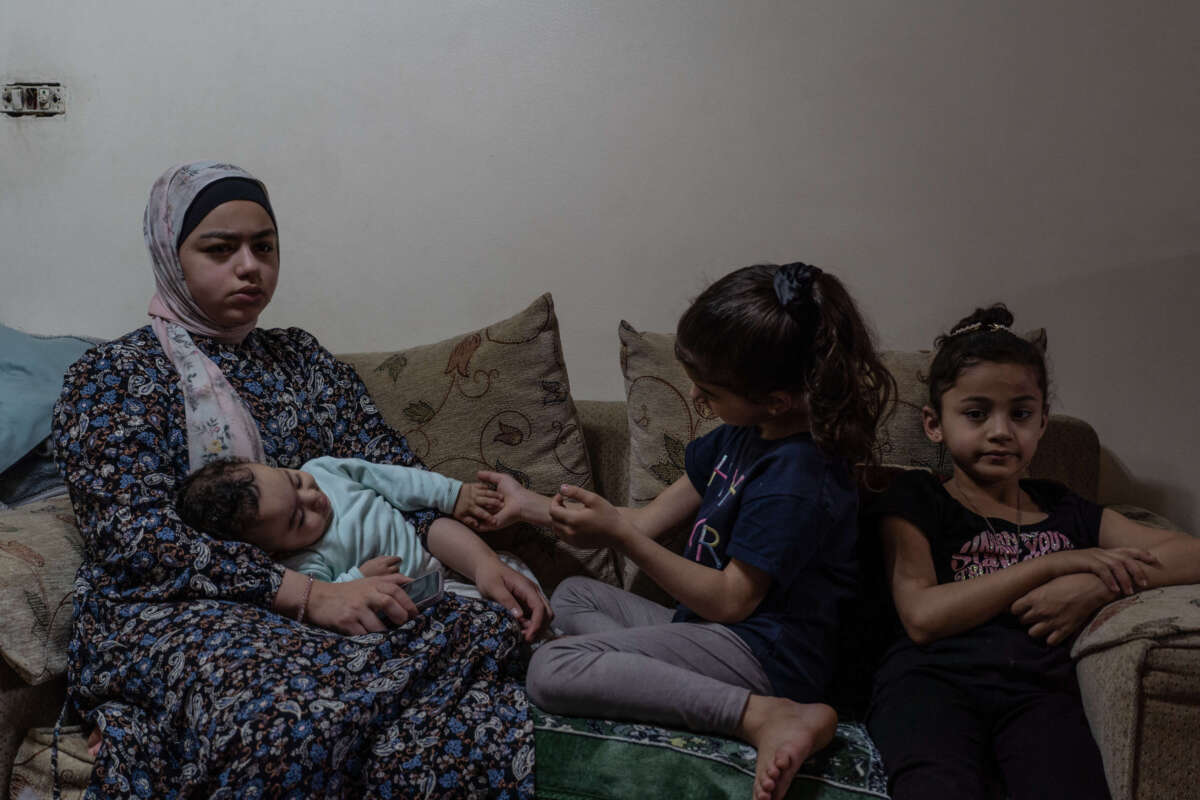
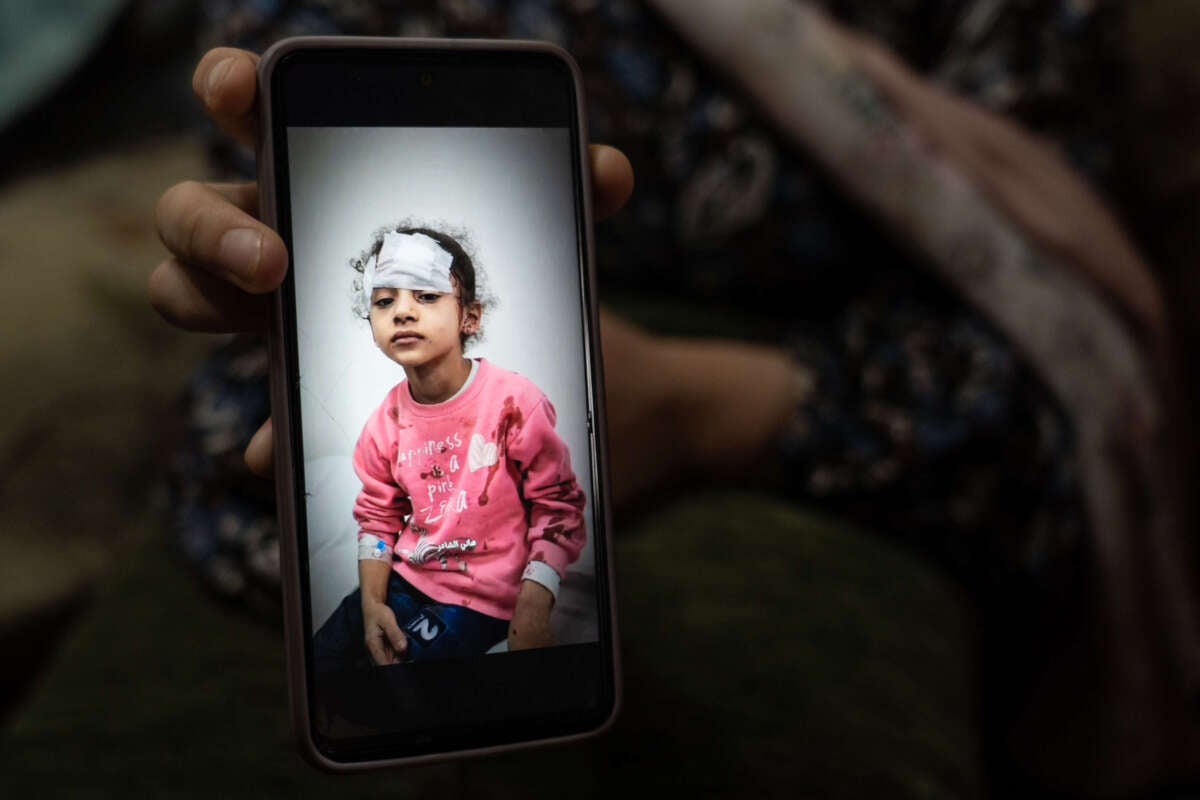
Press freedom is under attack
As Trump cracks down on political speech, independent media is increasingly necessary.
Truthout produces reporting you won’t see in the mainstream: journalism from the frontlines of global conflict, interviews with grassroots movement leaders, high-quality legal analysis and more.
Our work is possible thanks to reader support. Help Truthout catalyze change and social justice — make a tax-deductible monthly or one-time donation today.
